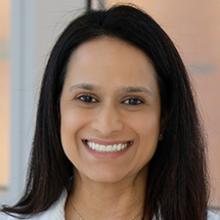Can storytelling be the key to boosting male physicians’ support for women in medicine? Researchers are beginning to examine whether—and how—that may be.
While a majority of medical students are women, significant gender inequities remain in the shares of women who are practicing physicians or holding leadership roles in medicine. Maya S. Iyer, MD, MEd, a pediatric emergency physician in Columbus, Ohio, said that more needs to be done to advance gender equity in medicine.
“A more comprehensive approach that fixes the system—instead of fixing the women—is imperative,” said the winning entry that Dr. Iyer and her co-investigator submitted to land a grant from the Joan F. Giambalvo Fund for the Advancement of Women. “One strategy in fixing the system is to promote and cultivate allyship,” which Dr. Iyer defined as support for promoting rights, representation and inclusion by members of an advantaged group to advance those who are marginalized.
The Giambalvo Fund was established by the AMA Women Physicians Section (AMA-WPS) in conjunction with the AMA Foundation, which provides scholarships of up to $10,000 to support research advancing the study of women in the medical profession and strengthening the AMA’s ability to identify and address the issues affecting women physicians and medical students.
The Giambalvo Fund’s first grant was awarded in 2006, and it has made 34 grants to date. Additionally, the AMA-WPS celebrates women physicians, residents and medical students every September during Women in Medicine Month, which also includes the AMA Women Physicians Section Inspiration Awards to honor physicians who have helped advance the careers of women in medicine.
“During Women in Medicine Month, the AMA is recognizing this year’s awardees for their excellent work aimed at addressing gender inequities and promoting the advancement of women in medicine,” said AMA President Bruce A. Scott, MD. “This annual grant program reaffirms the AMA’s commitment to addressing the most important issues facing women in medicine today, advocating for women’s health issues, and increasing the influence of women physicians overall.”
Uncovering the power of stories
Dr. Iyer’s research team will solicit, film and promote via social media videos of male leaders in academic medicine discussing instances when they worked as allies for women. Dr. Iyer proposes that it will be those personal stories that will inspire other allies to act in ways that dry text cannot.
“Storytelling is so powerful; I would say more so than reading your typical manuscripts or reading data,” she said in an interview with the AMA. “Seeing these stories as examples and [asking yourself]: Is that something I could do in my own work in my own life?”
Dr. Iyer will serve as the principal investigator. Jaclyn Caccesse, PhD, is her co-principal investigator.
We are “so grateful to receive this award,” said Dr. Iyer, an AMA member. “This is such an honor and privilege, and we would not be able to do this research without this award.”
She added that “having the backup and the support of the American Medical Association is just so important. The AMA is doing amazing work in the space of clinician well-being and gender equity, and so I think our efforts are really synergistic.”
The research that won this year’s grant will leverage the existing platform of The Ohio State University College of Medicine’s presence on X—the social media service formerly known as Twitter—to promote six short videos of prominent male physician leaders at the medical school. The videos will be posted on X, alternating monthly with written articles on the topic. After each article or video, viewers will be asked two questions about allyship. The hope is that the personal stories will offer concrete examples of how male physicians can be an ally for their women physician colleagues.
Gender inequities exist “within this hierarchy in academic medicine and medical education, and even if you teach individuals how to fish, it doesn't mean that they will be able to fish if the system is broken and the pond is dried out,” Dr. Iyer said. “We really have to have policies and programming in place that allow the system to kind of grow and allow everyone else to thrive.”
What happens when men speak up
Dr. Iyer said the stories might find their way to men who aren’t the typical audience for these discussions.
“The people who attend gender-equity conferences or professional development conferences are often the same,” Dr. Iyer said. “It becomes an echo chamber.”
She said storytelling from fellow men can “take the conversations around these topics and get it to a broader reach to show that supporting someone actually supports everyone in the work environment.” Ultimately, it’s about advancing the progress of women in medicine in a multitude of ways and investigating novel and unique approaches.
The AMA strongly supports equity and diversity across medicine and promotes professional growth and development for physicians at every stage of their careers. As part of the AMA’s celebration of Women in Medicine month, the AMA-WPS will host a webinar, “Women in Medicine: Our Journeys,” on Sept. 26, noon–1 p.m. CDT. The expert panelists will explore ways to support women in medicine as they face challenges aligning career goals with personal responsibilities.
The AMA-WPS consists of more than 100,000 members of the AMA and aims to increase the number and influence of women physicians in leadership roles and to advocate for and advance the understanding of women's health issues.





